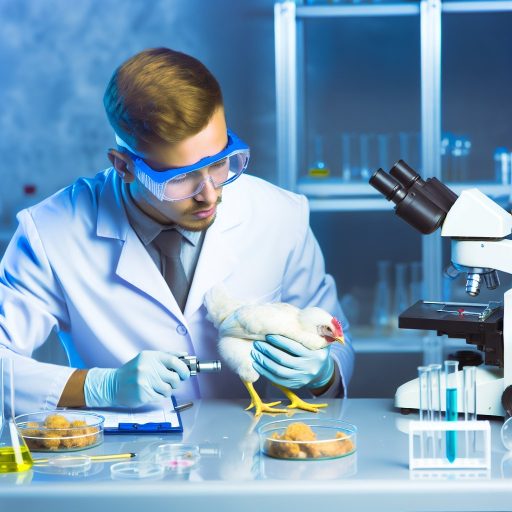Introduction:
Artificial insemination is vital in modern agriculture for breeding purposes.
Artificial insemination technicians play a crucial role in ensuring successful breeding.
Education and Training:
Artificial insemination technicians typically need a high school diploma or GED.
Some employers may require a post-secondary degree in animal science or a related field.
Specialized training programs in artificial insemination techniques are also available.
Completion of a certified training program can enhance job prospects and skills.
Obtaining certifications such as the Certified Artificial Insemination Technician (CAIT) can be beneficial.
Continuing education is important to stay current with advancements in the field.
Knowledge of Reproductive Anatomy:
Understanding the reproductive anatomy of animals is crucial for AI technicians.
This knowledge helps in identifying reproductive organs and their functions accurately.
Technicians must be familiar with the structure of the male and female reproductive systems.
Anatomy knowledge enables technicians to navigate through the complexities of reproductive processes.
Understanding the anatomy allows technicians to locate and properly handle reproductive organs during procedures.
Importance of Understanding Reproductive Anatomy:
- Precise knowledge of reproductive anatomy ensures successful insemination procedures.
- Technicians can identify potential issues or abnormalities in the reproductive system.
- This understanding helps in diagnosing infertility problems or reproductive disorders in animals.
- Knowledge of anatomy aids in selecting appropriate breeding techniques based on individual animal anatomy.
- By knowing the anatomy, technicians can anticipate any challenges during the insemination process.
You Might Also Like: Crop Rotation and Planning for Farm Managers
Technical Skills:
Artificial insemination technicians must possess specific technical skills to perform their job effectively.
These skills are crucial in handling equipment and materials properly to ensure successful results.
Knowledge of Equipment:
- Proficiency in operating and maintaining AI equipment such as thawing units, insemination guns, and microscopes.
- Understanding the functions and mechanisms of each piece of equipment to ensure accurate and precise insemination.
Handling of Materials:
- Proper handling and storage of semen straws to prevent damage or contamination.
- Ability to thaw semen straws at the correct temperature to maintain their quality and viability.
Attention to Detail:
- Attention to detail is crucial in every step of the artificial insemination process.
- Ensuring that all equipment is sterilized and cleaned before and after use to prevent infections and maintain hygiene.
- Accurately measuring and diluting semen doses according to the prescribed ratio to avoid under or overdosing.
Having strong technical skills is paramount for artificial insemination technicians to achieve successful outcomes in their work.
Attention to detail in handling equipment and materials is essential to ensure accuracy and precision in the insemination process.
Gain More Insights: Latest Trends in Irrigation Technology for Specialists
Communication Skills:
Communication skills play a vital role in the work of artificial insemination technicians.
Transform Your Career Today
Unlock a personalized career strategy that drives real results. Get tailored advice and a roadmap designed just for you.
Start NowHere’s why:
- Clear Instructions: Effective communication ensures that instructions are clearly understood by all technicians involved in the process.
- Minimizes Errors: Good communication reduces the chances of errors during insemination procedures, leading to higher success rates.
- Team Collaboration: Strong communication fosters teamwork among technicians, resulting in a more efficient and coordinated effort.
- Client Interaction: Technicians must also communicate effectively with clients to address any concerns and keep them informed throughout the process.
When working with animals, communication skills are just as important:
- Understanding Behavior: Technicians need to be able to interpret animal behavior and communicate any potential issues to their team.
- Calming Techniques: Good communication can help calm anxious animals during the insemination process, leading to better outcomes.
- Building Trust: By establishing a rapport with the animals through communication, technicians can gain their trust and cooperation.
- Ensuring Safety: Clear communication is crucial in ensuring the safety of both the animals and the technicians during procedures.
Effective communication is key to successful artificial insemination procedures, both in working with animals and fellow technicians.
Find Out More: Steps to Become a Quality Control Inspector in Farming
Problem-Solving Skills:
Artificial insemination technicians must think quickly and problem-solve on the spot.
Common issues that may arise during insemination procedures include:
- Difficulties with specimen collection
- Equipment malfunctions
- Unexpected reactions from animals
- Incorrect timing of insemination
You Might Also Like: Interview with a Professional Conservation Scientist

Hygiene and Sanitation Practices
Proper hygiene and sanitation practices are crucial for artificial insemination technicians to ensure the health and safety of both the technician and the animals involved in the process.
Maintaining a clean and sanitary work environment is essential to prevent the spread of infections and diseases during insemination procedures.
When performing artificial insemination, technicians must adhere to strict hygiene protocols to minimize the risk of contamination.
This includes wearing protective gear such as gloves, masks, and sterile clothing to prevent the introduction of pathogens into the reproductive tract of the animal.
Additionally, all equipment used in the procedure must be properly sanitized and disinfected before and after each use to prevent cross-contamination.
Failure to follow proper hygiene practices can have detrimental effects on the success rate of insemination.
Contamination during the process can lead to infections, reduced fertility rates, and even pregnancy loss in animals.
By maintaining a clean and sanitized work environment, technicians can improve the chances of successful insemination and ensure the health and well-being of the animals under their care.
It is important for artificial insemination technicians to undergo training in proper hygiene and sanitation practices.
This training should cover topics such as proper handwashing techniques, use of disinfectants, and sterilization of equipment to prevent the spread of infections.
Maintaining hygiene and sanitation practices is essential for artificial insemination technicians to ensure the success of insemination procedures and the health of the animals involved.
By following strict protocols and guidelines, technicians can minimize the risk of contamination and improve the overall outcomes of the insemination process.
- Emphasize maintaining a clean work environment during insemination procedures.
- Explain the impact of proper hygiene practices on the success rate of insemination.
Adaptability and Flexibility:
Being adaptable and flexible in different situations is crucial for artificial insemination technicians for several reasons.
Transform Your Career Today
Unlock a personalized career strategy that drives real results. Get tailored advice and a roadmap designed just for you.
Start Now- Handling Different Breeds: Technicians may encounter various breeds of animals with unique reproductive characteristics, requiring them to adjust their techniques accordingly.
- Changing Environment: The environment in which artificial insemination takes place can vary, such as different barn setups or outdoor conditions, necessitating flexibility in approach.
- Differing Temperaments: Animals have varying temperaments, which can impact the ease of the insemination process, and technicians must adapt their methods to handle each situation.
- Unexpected Challenges: Technicians may face unexpected challenges during the procedure, like a difficult-to-reach reproductive tract or unexpected reactions from the animal, requiring quick adjustments.
- Client Preferences: Clients may have specific preferences or requirements for the insemination process, and technicians need to be flexible in accommodating these requests.
Overall, the ability to adapt and be flexible in different situations is essential for artificial insemination technicians to ensure the success of the procedure and the well-being of the animals involved.
Essential Skills for Artificial Insemination Technicians
The top skills required for artificial insemination technicians include attention to detail, strong communication skills, and the ability to work well under pressure.
These skills are crucial in ensuring successful insemination procedures and overall animal health.
Having a keen eye for detail allows technicians to accurately perform procedures and monitor the progress of the animals.
Clear communication is essential for working effectively with other team members and ensuring that all tasks are carried out smoothly.
Additionally, the ability to work well under pressure is vital in this field, as technicians often need to perform procedures efficiently and quickly to maximize success rates.
These skills play a significant role in the success of artificial insemination procedures and ultimately contribute to the health and well-being of the animals involved.
Additional Resources
Artificial Insemination Technique: Cattle
Robotics industry is dead & a bad choice (for jobs) – change my mind
[E-Books for Sale]
The Big Book of 500 High-Paying Jobs in America: Unlock Your Earning Potential
$19.99 • 500 High-Paying Jobs • 330 pages
Explore 500 high-paying jobs in America and learn how to boost your career, earn more, and achieve success!
See All 500 High-Paying Jobs of this E-Book
1001 Professions Without a Degree: High-Paying American Jobs You Can Start Now
$19.99 • 1001 Professions Without a Degree • 174 pages
Discover 1001 high-paying jobs without a degree! Unlock career tips, skills, and success strategies for just $19.99!




